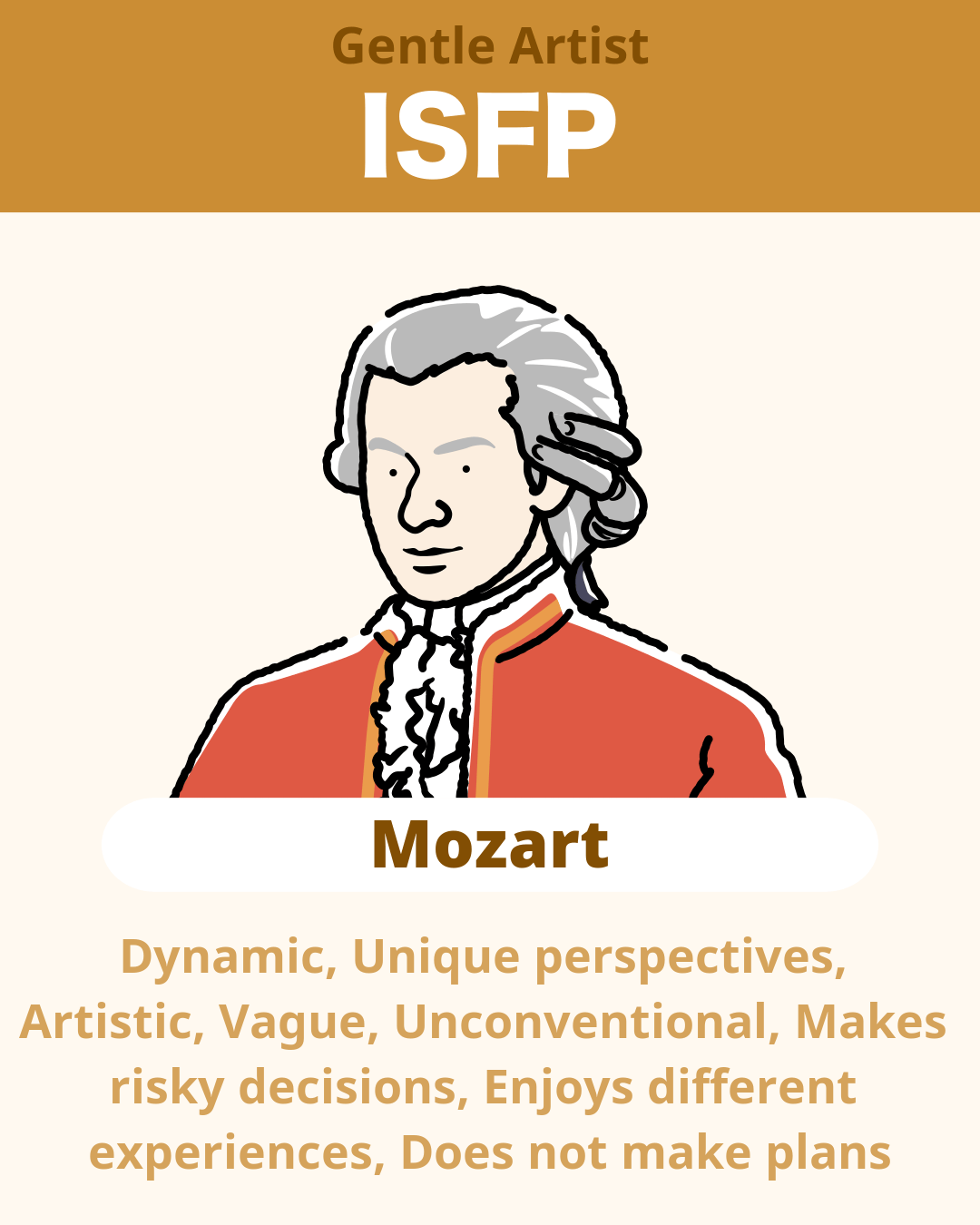
People with the ISFP personality type, also known as the Adventurer personality type, are sensitive, receptive, and have an artistic nature. They are gentle, considerate and take a friendly and neutral stance toward everyone. Because ISFPs value harmony, have mild temperaments and are peaceful in nature, they tend to not have many relationship problems in an organization. They are not good at setting and acting on long-term goals and plans, or making quick decisions. ISFPs are not good leaders because they do poorly in jobs or positions with a lot of responsibility. On the other hand, they are loyal to those that have earned their trust, and they are patient and flexible, so they do well as part of a team. As ISFPs have a sensitive and delicate side, they should take care not to worry too much about small things.





| Ranks | Types | % | |
|---|---|---|---|
| 1 | INFP | Vincent van Gogh | 13% |
| 2 | ENFP | Anne Frank | 11% |
| 3 | ISFP | Mozart★ | 8% |
| 4 | INTP | Albert Einstein | 8% |
| 5 | INFJ | Nightingale | 8% |
| 6 | ESFJ | Andrew Carnegie | 7% |
| 7 | ISFJ | Mother Teresa | 7% |
| 8 | ESFP | Marie Antoinette | 6% |
| 9 | ENTP | Thomas Edison | 6% |
| 10 | ENFJ | Joan of Arc | 5% |
| 11 | ISTJ | Sigmund Freud | 4% |
| 12 | ISTP | Spartacus | 4% |
| 13 | INTJ | Leonardo da Vinci | 4% |
| 14 | ESTJ | George Washington | 3% |
| 15 | ESTP | Columbus | 3% |
| 16 | ENTJ | Napoleon | 3% |
Personality types are important to study because they help us learn more about ourselves and others. By knowing a person's personality type, we can learn more about how they like to learn and think and how they like to act and interact with the world around them.
Learning about your personality may also help you see your weaknesses and limits, so you can be aware of them and work on them. The ISFP personality type is sensitive and spontaneous, and they want to make the world around them beautiful and peaceful. They may be quiet and shy at first, but they are very wise and outgoing once you get to know them.
Katherine Cook Briggs and her daughter Isabel Briggs Myers came up with the idea to use 4-letter acronyms to describe the 16 basic personality types. In the 1960s, these two people developed the Myers-Briggs Type Indicator (MBTI) system. The work of psychologist Carl Jung inspired it.
Even though modern psychology has developed some new ideas about personality and mental illness, the MBTI system is still very useful for real-life situations and relationships. The Myers-Briggs system is based on an acronym for a person's personality traits, functions, and preferences. The ISFP breaks it down like this:
The I in ISFP remains for introversion, which shows where you prefer to focus your energy and attention. Introverts get energy from thinking about and remembering their thoughts and feelings. Their inner ideas and thoughts are real and important.
People sometimes like the idea of something more than the thing itself. Introverts think about what they want to say and do before they do it. They like to do things alone or with a small group of people they know well.
The S in ISFP stands for sensing, which shows how you like learning and processing information. The best way for a sensing person to learn and remember something is if it is real and can be seen, touched, smelled, tasted, or heard. Most of the time, they learn by doing and remember specific information about what they did rather than general ideas and concepts.
The F in ISFP stands for feeling. This doesn't mean how emotional you are but how you like to make decisions. A feeling personality makes decisions based on the situation, and everyone involves feelings, opinions, and points of view.
ISFPs know themselves and can talk about their feelings, emotions, and inner lives. They think about all the possible outcomes and try to make decisions that will bring everyone together and make them feel good. They usually talk to people in a warm, caring, and quiet way.
The "P" in ISFP stands for "perceiving," which is how you act on the outside and how you like to be seen by others. A perceiving person is relaxed and spontaneous, and their life is unplanned. They don't attempt to organize or control the world around them. Instead, they try to understand it and fit into it.
They are flexible, casual, and willing to try new things. The ISFP type is called The Artist or The Composer. They are kind, warm, down-to-earth, practical, and open to new things and experiences. Because they are sensitive and expressive with their senses, they are natural artists and craftspeople with a strong sense of beauty.
The ISFP personality type is found in 6–10% of American women and 4–9% of the population. It is more common in women. Many famous musicians, like Prince, Bob Dylan, Rihanna, David Bowie, Barbara Streisand, and even Mozart, have the ISFP personality type.
The ISFP cares deeply about things and is enthusiastic and hopeful. They are, nonetheless, very self-aware and capable of expressing their sentiments, emotions, and inner lives.
The ISFP is in tune with other people's feelings and emotions. They notice small details and respond appropriately. They listen carefully, talk diplomatically and tactfully, and often give good advice.
The ISFP is adaptable and has an open mind. They are willing to attempt new things and learn from their mistakes. Because they understand by doing, they want to try things out for themselves and wait to form an opinion until they have a solid foundation. This can lead them to go on adventures on the spot or spend hours doing research in a lab.
ISFPs don't like to follow the rules and go their own way. Because they want to be themselves, they make different and creative choices and follow their imaginations.
The ISFP is warm and kind, which makes it easy for them to make deep and loyal friends. The ISFP shows who they are through sensory experiences and cares about giving others beautiful experiences. They make things that show their imaginative abilities and have a strong sense of what looks good.
Here are the main things that the ISFP personality type does not do well.
ISFPs are easily upset by inadvertent remarks and take these things personally, even if they aren't meant to. Also, their ambition to bring about beauty and harmony can make them avoid conflict but not stand up for themself, even when it's important to have healthy boundaries. This can lead to anger or a big outburst of bad feelings.
ISFPs like to keep their options open, which often hurts them. They are hesitant to miss any opportunities, which might lead to them not making choices or taking action to get them closer to their objectives. So, their fear of missing out can backfire and cost them chances.
The spontaneous, flexible, and indecisive ISFP is often struck by a new passion or idea out of the blue and goes in a different direction than expected. But sometimes, their emotions can be hard to predict, and they may suddenly show jealousy or a desire to win, anger or resentment, frustration, or annoyance.
These bad feelings can happen when someone is stressed, hurt, or wants to talk about their inner life and experiences. But they can surprise people who are used to this type of person being kind and caring.
They don't make long-term plans or commitments even though they know they probably won't keep them and don't want to be tied down by them. A sense of rules, tradition, structure, and order can also stifle an ISFP and make them feel like they can't be themselves or express themselves. As you can see, the ISFP is easy to like but can be hard to work with.
ISFPs often have a hard time with their careers because they have trouble setting goals and following through on them, unlike their INFJ cousins. ISFPs usually don't do well in jobs like executives and managers that require a lot of consistency and commitment. Instead, an ISFP is nicer at jobs such as:
The ISFP is not likely to ever get good at keeping lists, residing on schedule, and deadlines. Of course, with some effort and compromise, they may be able to adopt a system (or planner or app) that benefits them, but it will almost certainly be a struggle, and the ISFP and others around them should ease many of those sorts of expectations.
Instead, the ISFP should concentrate on their feelings and be honest to grow as a person. The sensitive ISFP tries to avoid conflict and works for harmony too often at the cost of telling the truth. This is especially bad for ISFPs because they care a lot about how they come across to others.
So, they need to discover novel approaches to be open and honest and, when necessary, have hard conversations. If they talk about their feelings when they happen, they'll be less likely to have a sudden outburst, and they'll also be able to set proper boundaries that will make their relationships stronger.
ISFPs should have jobs that are both intellectually challenging and related to a personal passion. People with this personality type should be able to show their creativity and work independently. People think the following are among the best jobs for ISFPs.
ISFPs are known for being sensitive and observant, which helps them understand other people. These traits are helpful in marketing, where the key to success is to cater to a specific audience.
As marketing managers, ISFP personality types can handle many projects and meet tight deadlines. In the meantime, this job allows you to be creative by creating different marketing campaigns. This type of person is especially good at coming up with new ideas through brainstorming.
The energy, creativity, and spontaneity of an ISFP make it a great fit for jobs in the restaurant business. Working in a kitchen gives me many chances to try new things. Chefs can work as a team with each other, but they can still make their dishes on their own.
The fast-paced setting is a good fit for anyone with this kind of personality. ISFP types also like that they can easily switch jobs and use their cooking skills to work anywhere in the world.
ISFPs are good candidates for careers in the arts because they are creative thinkers. ISFPs talented in the arts do well as photographers, sculptors, or musicians. Some artistic activities can make it hard to make a steady income, but jobs like art director, interior decorator, or graphic designer can pay very well.
Most jobs in the arts involve hands-on work, which ISFP types like. If you like to work alone, you might like freelancing, where you work with different clients on different short-term projects.
ISFPs make the world a better place because they are unique and creative. Also, they are good friends who care about each other and love them. Everywhere an artist goes, they make beautiful things. Check out our guide for newcomers to the 16 MBTI personality types to learn more about them. If you require to find out what kind of person you are, we've compiled a list of the most effective online personality exams for you.